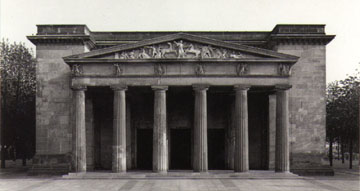

1918: During the Weimar period, the guardhouse became a memorial to the dead of WWI, designed by Heinrich Tessenau
1931: Memorial renovations completed; a circular opening in the roof is added which allows light as well as the natural elements such as rain to enter the guardhouse
1950: More renovations take place to restore the building after damage from Allied bombs
1960: Rededicated by the GDR as the "Memorial to the Victims of Fascism and Militarism" and a guard of honor is posted outside
1969: Redesigned; an eternal flame is added and stones set in the floor marked graves of an Unknown Soldier and Unknown Resistance Fighter. Urns containing earth from concentration camps and WWII battlefields are also set in the floor
1990: Memorial closed and East German Army is disbanded
1993: Rededicated by Chancellor Helmut Kohl as the "Central Memorial to the Victims of War and Tyranny" in order to commemorate the victims of both world wars, tyranny, racial persecution, resistance, expulsion, division, and terrorism. This implied an equality of victims and sparked a national debate, ending in a parliamentary compromise for a specifically Jewish Holocaust memorial near the Brandenburg Gate the length of more than two football fields; Käthe Kollwitz sculpture added to the memorial